An Analysis of Catholic Social Thought Principles and Their Impact
VerifiedAdded on 2023/01/05
|7
|1727
|40
Report
AI Summary
This report provides a comprehensive overview of Catholic Social Thought, defining and explaining three core principles: The Common Good, The Preferential Option for the Poor and Vulnerable, and The Life and Dignity of the Human Person. It connects these principles to real-world communities and demonstrates their relevance. The report then presents a short story, "Music as Passion," illustrating these principles through the narrative of a young woman overcoming adversity. Finally, the author offers a personal reflection, connecting the story's themes to the principles of Catholic Social Thought, emphasizing the importance of social justice, human dignity, and support for the marginalized. The report concludes with a list of relevant academic references.
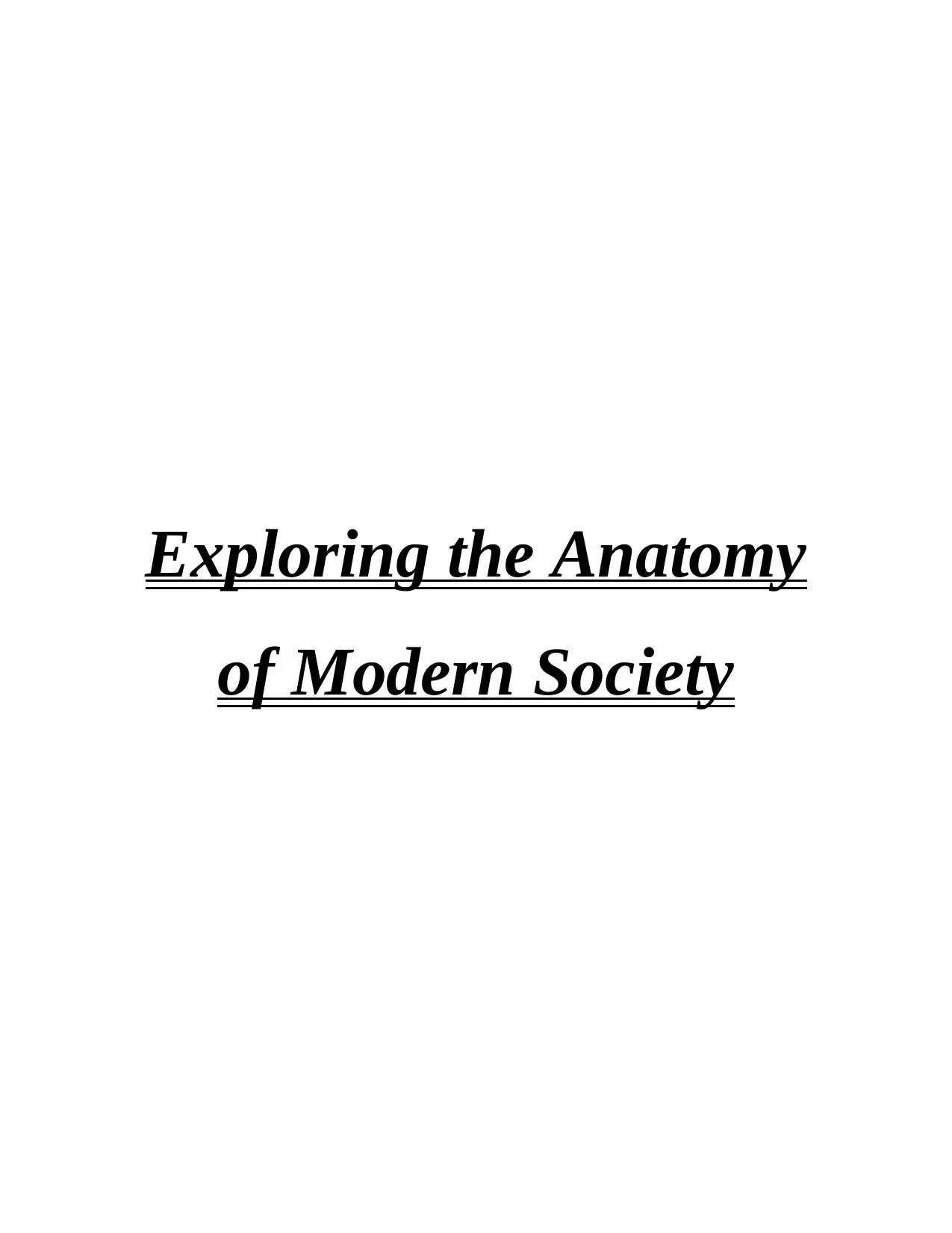
Exploring the Anatomy
of Modern Society
of Modern Society
Paraphrase This Document
Need a fresh take? Get an instant paraphrase of this document with our AI Paraphraser
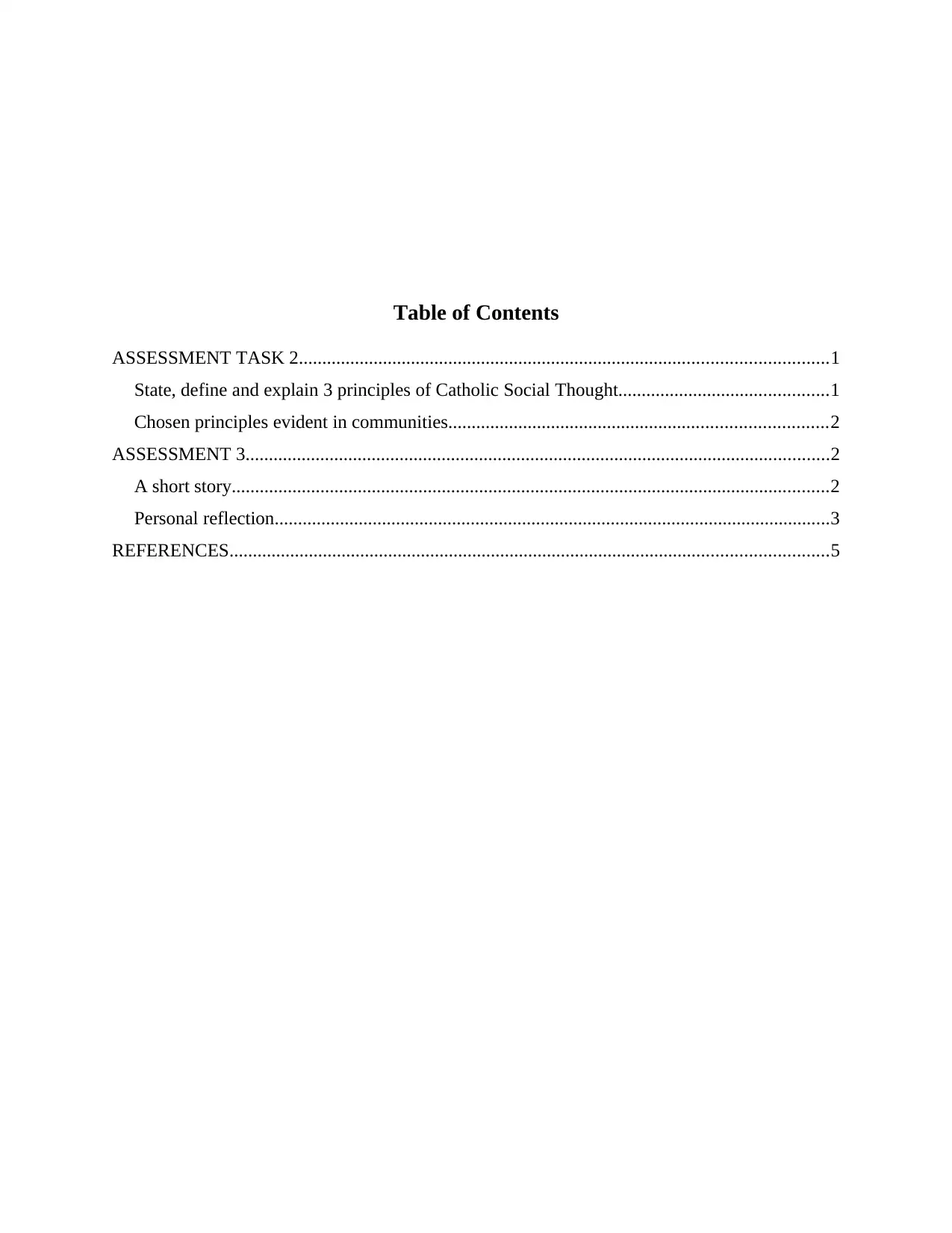
Table of Contents
ASSESSMENT TASK 2.................................................................................................................1
State, define and explain 3 principles of Catholic Social Thought.............................................1
Chosen principles evident in communities.................................................................................2
ASSESSMENT 3.............................................................................................................................2
A short story................................................................................................................................2
Personal reflection.......................................................................................................................3
REFERENCES................................................................................................................................5
ASSESSMENT TASK 2.................................................................................................................1
State, define and explain 3 principles of Catholic Social Thought.............................................1
Chosen principles evident in communities.................................................................................2
ASSESSMENT 3.............................................................................................................................2
A short story................................................................................................................................2
Personal reflection.......................................................................................................................3
REFERENCES................................................................................................................................5
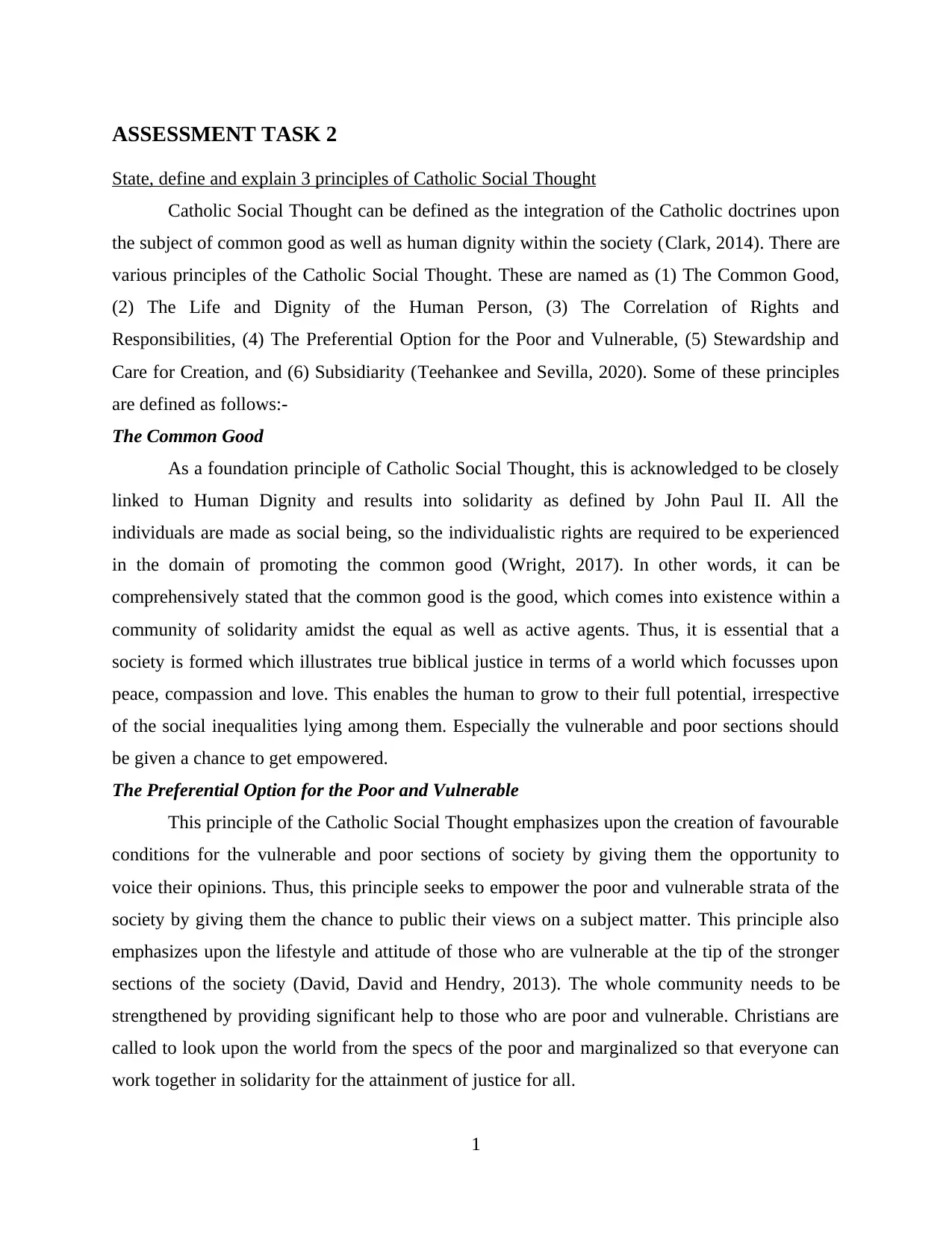
ASSESSMENT TASK 2
State, define and explain 3 principles of Catholic Social Thought
Catholic Social Thought can be defined as the integration of the Catholic doctrines upon
the subject of common good as well as human dignity within the society (Clark, 2014). There are
various principles of the Catholic Social Thought. These are named as (1) The Common Good,
(2) The Life and Dignity of the Human Person, (3) The Correlation of Rights and
Responsibilities, (4) The Preferential Option for the Poor and Vulnerable, (5) Stewardship and
Care for Creation, and (6) Subsidiarity (Teehankee and Sevilla, 2020). Some of these principles
are defined as follows:-
The Common Good
As a foundation principle of Catholic Social Thought, this is acknowledged to be closely
linked to Human Dignity and results into solidarity as defined by John Paul II. All the
individuals are made as social being, so the individualistic rights are required to be experienced
in the domain of promoting the common good (Wright, 2017). In other words, it can be
comprehensively stated that the common good is the good, which comes into existence within a
community of solidarity amidst the equal as well as active agents. Thus, it is essential that a
society is formed which illustrates true biblical justice in terms of a world which focusses upon
peace, compassion and love. This enables the human to grow to their full potential, irrespective
of the social inequalities lying among them. Especially the vulnerable and poor sections should
be given a chance to get empowered.
The Preferential Option for the Poor and Vulnerable
This principle of the Catholic Social Thought emphasizes upon the creation of favourable
conditions for the vulnerable and poor sections of society by giving them the opportunity to
voice their opinions. Thus, this principle seeks to empower the poor and vulnerable strata of the
society by giving them the chance to public their views on a subject matter. This principle also
emphasizes upon the lifestyle and attitude of those who are vulnerable at the tip of the stronger
sections of the society (David, David and Hendry, 2013). The whole community needs to be
strengthened by providing significant help to those who are poor and vulnerable. Christians are
called to look upon the world from the specs of the poor and marginalized so that everyone can
work together in solidarity for the attainment of justice for all.
1
State, define and explain 3 principles of Catholic Social Thought
Catholic Social Thought can be defined as the integration of the Catholic doctrines upon
the subject of common good as well as human dignity within the society (Clark, 2014). There are
various principles of the Catholic Social Thought. These are named as (1) The Common Good,
(2) The Life and Dignity of the Human Person, (3) The Correlation of Rights and
Responsibilities, (4) The Preferential Option for the Poor and Vulnerable, (5) Stewardship and
Care for Creation, and (6) Subsidiarity (Teehankee and Sevilla, 2020). Some of these principles
are defined as follows:-
The Common Good
As a foundation principle of Catholic Social Thought, this is acknowledged to be closely
linked to Human Dignity and results into solidarity as defined by John Paul II. All the
individuals are made as social being, so the individualistic rights are required to be experienced
in the domain of promoting the common good (Wright, 2017). In other words, it can be
comprehensively stated that the common good is the good, which comes into existence within a
community of solidarity amidst the equal as well as active agents. Thus, it is essential that a
society is formed which illustrates true biblical justice in terms of a world which focusses upon
peace, compassion and love. This enables the human to grow to their full potential, irrespective
of the social inequalities lying among them. Especially the vulnerable and poor sections should
be given a chance to get empowered.
The Preferential Option for the Poor and Vulnerable
This principle of the Catholic Social Thought emphasizes upon the creation of favourable
conditions for the vulnerable and poor sections of society by giving them the opportunity to
voice their opinions. Thus, this principle seeks to empower the poor and vulnerable strata of the
society by giving them the chance to public their views on a subject matter. This principle also
emphasizes upon the lifestyle and attitude of those who are vulnerable at the tip of the stronger
sections of the society (David, David and Hendry, 2013). The whole community needs to be
strengthened by providing significant help to those who are poor and vulnerable. Christians are
called to look upon the world from the specs of the poor and marginalized so that everyone can
work together in solidarity for the attainment of justice for all.
1
⊘ This is a preview!⊘
Do you want full access?
Subscribe today to unlock all pages.

Trusted by 1+ million students worldwide
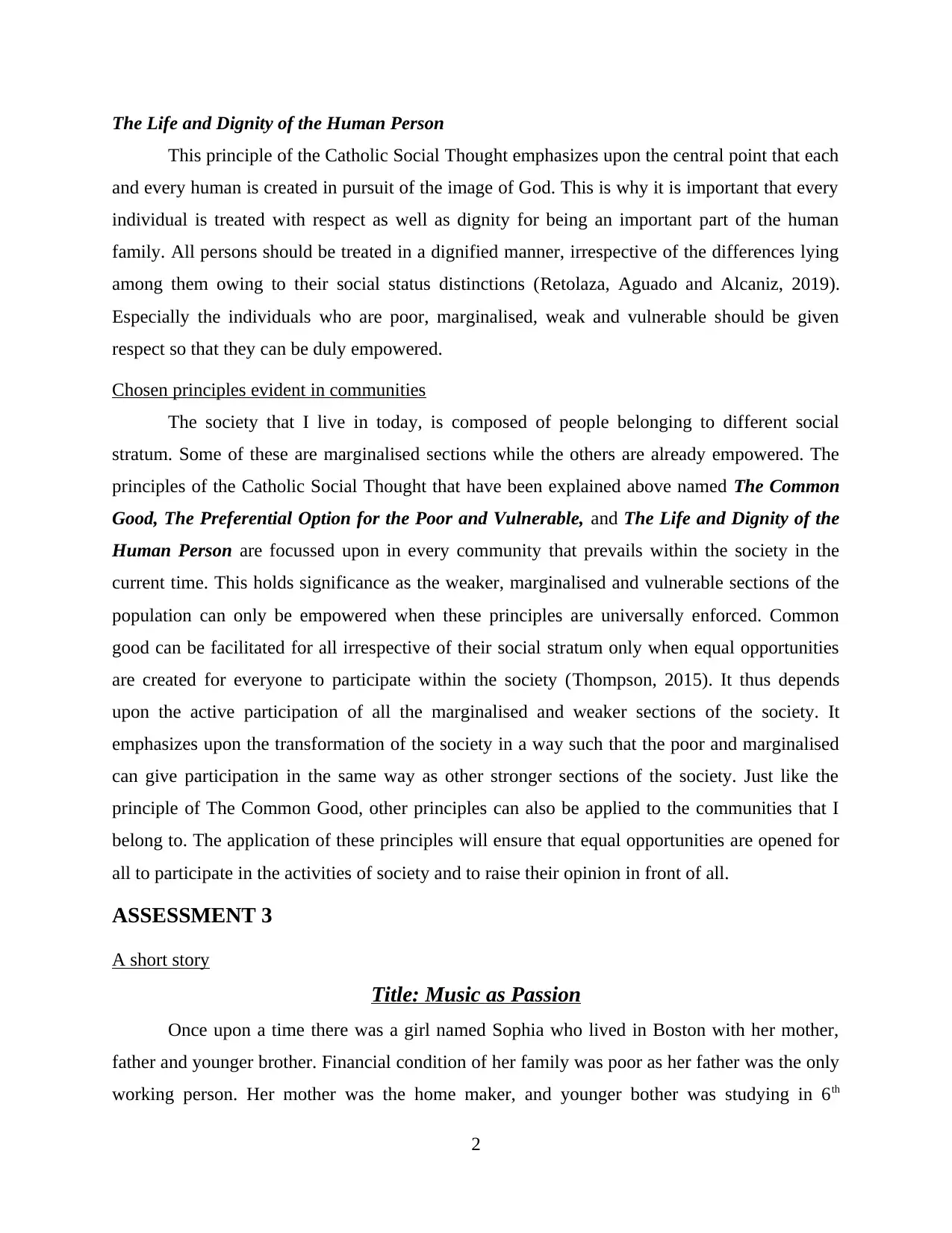
The Life and Dignity of the Human Person
This principle of the Catholic Social Thought emphasizes upon the central point that each
and every human is created in pursuit of the image of God. This is why it is important that every
individual is treated with respect as well as dignity for being an important part of the human
family. All persons should be treated in a dignified manner, irrespective of the differences lying
among them owing to their social status distinctions (Retolaza, Aguado and Alcaniz, 2019).
Especially the individuals who are poor, marginalised, weak and vulnerable should be given
respect so that they can be duly empowered.
Chosen principles evident in communities
The society that I live in today, is composed of people belonging to different social
stratum. Some of these are marginalised sections while the others are already empowered. The
principles of the Catholic Social Thought that have been explained above named The Common
Good, The Preferential Option for the Poor and Vulnerable, and The Life and Dignity of the
Human Person are focussed upon in every community that prevails within the society in the
current time. This holds significance as the weaker, marginalised and vulnerable sections of the
population can only be empowered when these principles are universally enforced. Common
good can be facilitated for all irrespective of their social stratum only when equal opportunities
are created for everyone to participate within the society (Thompson, 2015). It thus depends
upon the active participation of all the marginalised and weaker sections of the society. It
emphasizes upon the transformation of the society in a way such that the poor and marginalised
can give participation in the same way as other stronger sections of the society. Just like the
principle of The Common Good, other principles can also be applied to the communities that I
belong to. The application of these principles will ensure that equal opportunities are opened for
all to participate in the activities of society and to raise their opinion in front of all.
ASSESSMENT 3
A short story
Title: Music as Passion
Once upon a time there was a girl named Sophia who lived in Boston with her mother,
father and younger brother. Financial condition of her family was poor as her father was the only
working person. Her mother was the home maker, and younger bother was studying in 6th
2
This principle of the Catholic Social Thought emphasizes upon the central point that each
and every human is created in pursuit of the image of God. This is why it is important that every
individual is treated with respect as well as dignity for being an important part of the human
family. All persons should be treated in a dignified manner, irrespective of the differences lying
among them owing to their social status distinctions (Retolaza, Aguado and Alcaniz, 2019).
Especially the individuals who are poor, marginalised, weak and vulnerable should be given
respect so that they can be duly empowered.
Chosen principles evident in communities
The society that I live in today, is composed of people belonging to different social
stratum. Some of these are marginalised sections while the others are already empowered. The
principles of the Catholic Social Thought that have been explained above named The Common
Good, The Preferential Option for the Poor and Vulnerable, and The Life and Dignity of the
Human Person are focussed upon in every community that prevails within the society in the
current time. This holds significance as the weaker, marginalised and vulnerable sections of the
population can only be empowered when these principles are universally enforced. Common
good can be facilitated for all irrespective of their social stratum only when equal opportunities
are created for everyone to participate within the society (Thompson, 2015). It thus depends
upon the active participation of all the marginalised and weaker sections of the society. It
emphasizes upon the transformation of the society in a way such that the poor and marginalised
can give participation in the same way as other stronger sections of the society. Just like the
principle of The Common Good, other principles can also be applied to the communities that I
belong to. The application of these principles will ensure that equal opportunities are opened for
all to participate in the activities of society and to raise their opinion in front of all.
ASSESSMENT 3
A short story
Title: Music as Passion
Once upon a time there was a girl named Sophia who lived in Boston with her mother,
father and younger brother. Financial condition of her family was poor as her father was the only
working person. Her mother was the home maker, and younger bother was studying in 6th
2
Paraphrase This Document
Need a fresh take? Get an instant paraphrase of this document with our AI Paraphraser
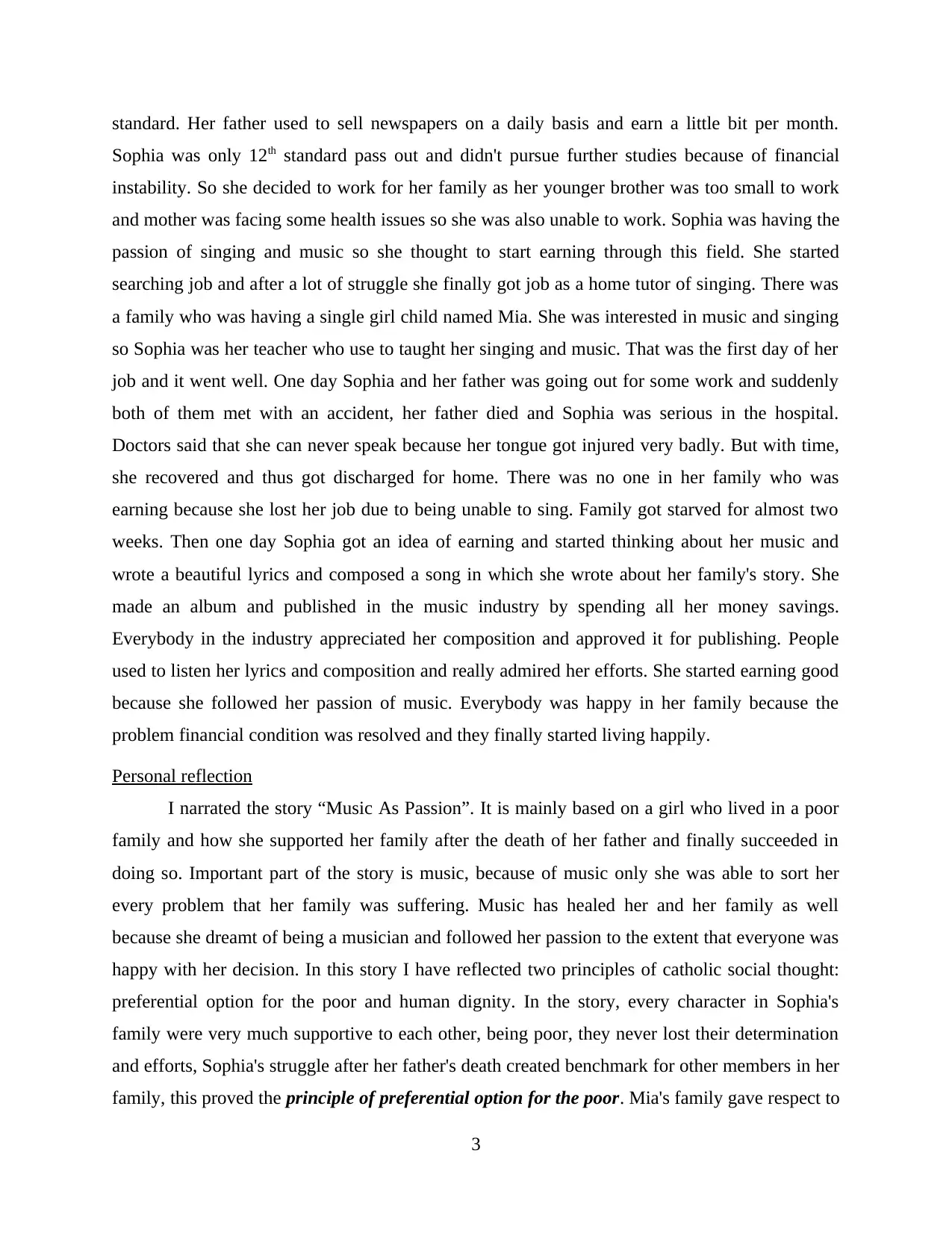
standard. Her father used to sell newspapers on a daily basis and earn a little bit per month.
Sophia was only 12th standard pass out and didn't pursue further studies because of financial
instability. So she decided to work for her family as her younger brother was too small to work
and mother was facing some health issues so she was also unable to work. Sophia was having the
passion of singing and music so she thought to start earning through this field. She started
searching job and after a lot of struggle she finally got job as a home tutor of singing. There was
a family who was having a single girl child named Mia. She was interested in music and singing
so Sophia was her teacher who use to taught her singing and music. That was the first day of her
job and it went well. One day Sophia and her father was going out for some work and suddenly
both of them met with an accident, her father died and Sophia was serious in the hospital.
Doctors said that she can never speak because her tongue got injured very badly. But with time,
she recovered and thus got discharged for home. There was no one in her family who was
earning because she lost her job due to being unable to sing. Family got starved for almost two
weeks. Then one day Sophia got an idea of earning and started thinking about her music and
wrote a beautiful lyrics and composed a song in which she wrote about her family's story. She
made an album and published in the music industry by spending all her money savings.
Everybody in the industry appreciated her composition and approved it for publishing. People
used to listen her lyrics and composition and really admired her efforts. She started earning good
because she followed her passion of music. Everybody was happy in her family because the
problem financial condition was resolved and they finally started living happily.
Personal reflection
I narrated the story “Music As Passion”. It is mainly based on a girl who lived in a poor
family and how she supported her family after the death of her father and finally succeeded in
doing so. Important part of the story is music, because of music only she was able to sort her
every problem that her family was suffering. Music has healed her and her family as well
because she dreamt of being a musician and followed her passion to the extent that everyone was
happy with her decision. In this story I have reflected two principles of catholic social thought:
preferential option for the poor and human dignity. In the story, every character in Sophia's
family were very much supportive to each other, being poor, they never lost their determination
and efforts, Sophia's struggle after her father's death created benchmark for other members in her
family, this proved the principle of preferential option for the poor. Mia's family gave respect to
3
Sophia was only 12th standard pass out and didn't pursue further studies because of financial
instability. So she decided to work for her family as her younger brother was too small to work
and mother was facing some health issues so she was also unable to work. Sophia was having the
passion of singing and music so she thought to start earning through this field. She started
searching job and after a lot of struggle she finally got job as a home tutor of singing. There was
a family who was having a single girl child named Mia. She was interested in music and singing
so Sophia was her teacher who use to taught her singing and music. That was the first day of her
job and it went well. One day Sophia and her father was going out for some work and suddenly
both of them met with an accident, her father died and Sophia was serious in the hospital.
Doctors said that she can never speak because her tongue got injured very badly. But with time,
she recovered and thus got discharged for home. There was no one in her family who was
earning because she lost her job due to being unable to sing. Family got starved for almost two
weeks. Then one day Sophia got an idea of earning and started thinking about her music and
wrote a beautiful lyrics and composed a song in which she wrote about her family's story. She
made an album and published in the music industry by spending all her money savings.
Everybody in the industry appreciated her composition and approved it for publishing. People
used to listen her lyrics and composition and really admired her efforts. She started earning good
because she followed her passion of music. Everybody was happy in her family because the
problem financial condition was resolved and they finally started living happily.
Personal reflection
I narrated the story “Music As Passion”. It is mainly based on a girl who lived in a poor
family and how she supported her family after the death of her father and finally succeeded in
doing so. Important part of the story is music, because of music only she was able to sort her
every problem that her family was suffering. Music has healed her and her family as well
because she dreamt of being a musician and followed her passion to the extent that everyone was
happy with her decision. In this story I have reflected two principles of catholic social thought:
preferential option for the poor and human dignity. In the story, every character in Sophia's
family were very much supportive to each other, being poor, they never lost their determination
and efforts, Sophia's struggle after her father's death created benchmark for other members in her
family, this proved the principle of preferential option for the poor. Mia's family gave respect to
3

Sophia although she was poor otherwise racism of upper cast and lower cast generally occurs in
these situations. Moreover, music industry supported Sophia in every possible way to showcase
her talent in front of the world, this proved another principle of human dignity.
4
these situations. Moreover, music industry supported Sophia in every possible way to showcase
her talent in front of the world, this proved another principle of human dignity.
4
⊘ This is a preview!⊘
Do you want full access?
Subscribe today to unlock all pages.

Trusted by 1+ million students worldwide
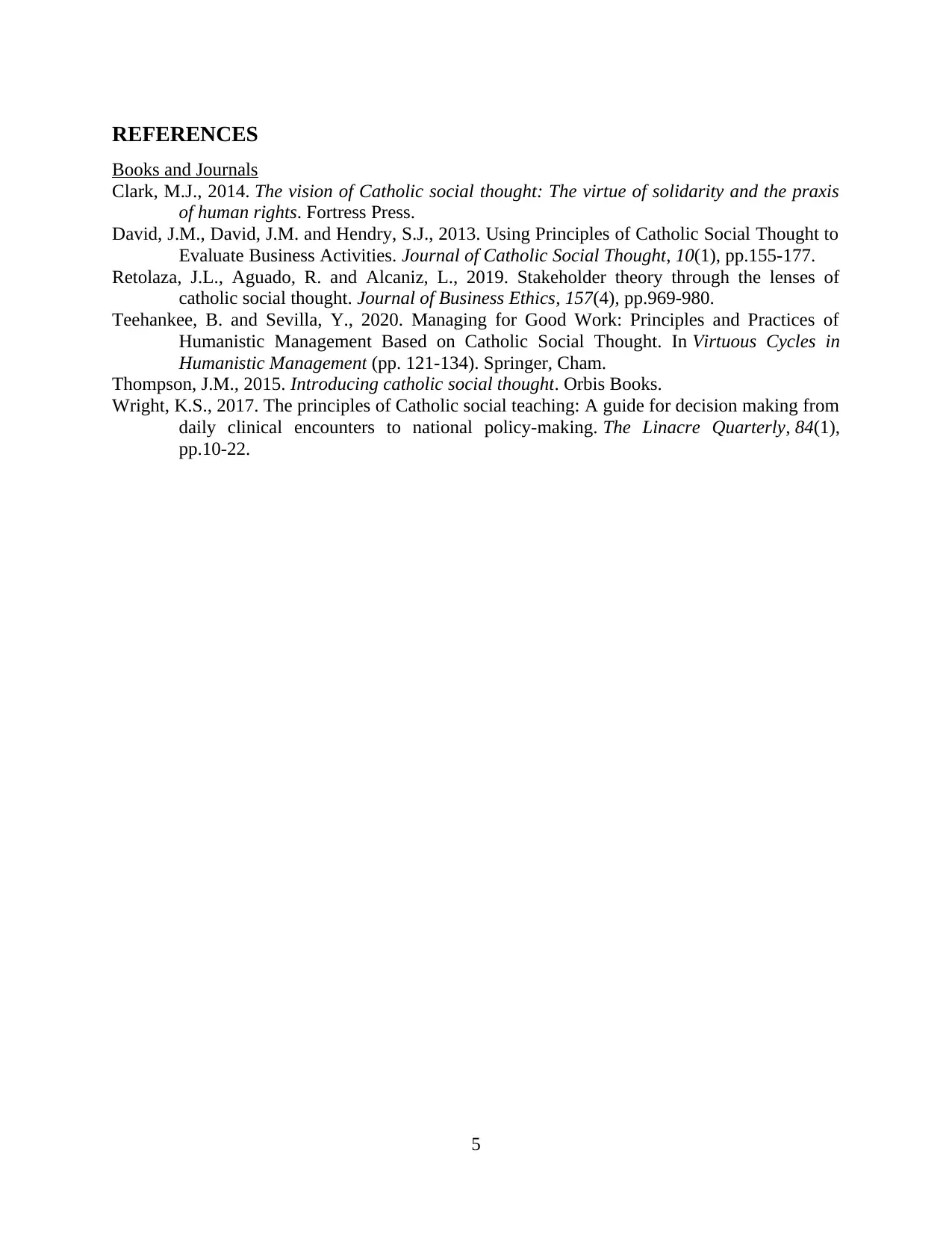
REFERENCES
Books and Journals
Clark, M.J., 2014. The vision of Catholic social thought: The virtue of solidarity and the praxis
of human rights. Fortress Press.
David, J.M., David, J.M. and Hendry, S.J., 2013. Using Principles of Catholic Social Thought to
Evaluate Business Activities. Journal of Catholic Social Thought, 10(1), pp.155-177.
Retolaza, J.L., Aguado, R. and Alcaniz, L., 2019. Stakeholder theory through the lenses of
catholic social thought. Journal of Business Ethics, 157(4), pp.969-980.
Teehankee, B. and Sevilla, Y., 2020. Managing for Good Work: Principles and Practices of
Humanistic Management Based on Catholic Social Thought. In Virtuous Cycles in
Humanistic Management (pp. 121-134). Springer, Cham.
Thompson, J.M., 2015. Introducing catholic social thought. Orbis Books.
Wright, K.S., 2017. The principles of Catholic social teaching: A guide for decision making from
daily clinical encounters to national policy-making. The Linacre Quarterly, 84(1),
pp.10-22.
5
Books and Journals
Clark, M.J., 2014. The vision of Catholic social thought: The virtue of solidarity and the praxis
of human rights. Fortress Press.
David, J.M., David, J.M. and Hendry, S.J., 2013. Using Principles of Catholic Social Thought to
Evaluate Business Activities. Journal of Catholic Social Thought, 10(1), pp.155-177.
Retolaza, J.L., Aguado, R. and Alcaniz, L., 2019. Stakeholder theory through the lenses of
catholic social thought. Journal of Business Ethics, 157(4), pp.969-980.
Teehankee, B. and Sevilla, Y., 2020. Managing for Good Work: Principles and Practices of
Humanistic Management Based on Catholic Social Thought. In Virtuous Cycles in
Humanistic Management (pp. 121-134). Springer, Cham.
Thompson, J.M., 2015. Introducing catholic social thought. Orbis Books.
Wright, K.S., 2017. The principles of Catholic social teaching: A guide for decision making from
daily clinical encounters to national policy-making. The Linacre Quarterly, 84(1),
pp.10-22.
5
1 out of 7
Related Documents
Your All-in-One AI-Powered Toolkit for Academic Success.
+13062052269
info@desklib.com
Available 24*7 on WhatsApp / Email
![[object Object]](/_next/static/media/star-bottom.7253800d.svg)
Unlock your academic potential
Copyright © 2020–2026 A2Z Services. All Rights Reserved. Developed and managed by ZUCOL.




